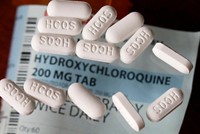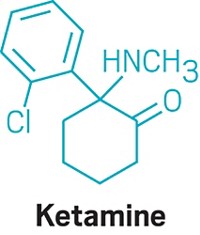Advertisement
Grab your lab coat. Let's get started
Welcome!
Welcome!
Create an account below to get 6 C&EN articles per month, receive newsletters and more - all free.
It seems this is your first time logging in online. Please enter the following information to continue.
As an ACS member you automatically get access to this site. All we need is few more details to create your reading experience.
Not you? Sign in with a different account.
Not you? Sign in with a different account.
ERROR 1
ERROR 1
ERROR 2
ERROR 2
ERROR 2
ERROR 2
ERROR 2
Password and Confirm password must match.
If you have an ACS member number, please enter it here so we can link this account to your membership. (optional)
ERROR 2
ACS values your privacy. By submitting your information, you are gaining access to C&EN and subscribing to our weekly newsletter. We use the information you provide to make your reading experience better, and we will never sell your data to third party members.
Pharmaceuticals
Antidepressants May Be Unsafe for Minors
Drugs should carry warnings about suicidal risk, FDA panel decides
by BETTE HILEMAN
September 27, 2004
| A version of this story appeared in
Volume 82, Issue 39
A special Food & Drug Administration advisory panel has issued a strong recommendation that the agency require new warnings to patients about the safety of all antidepressant drugs used by children. The recommendation followed two days of hearings where a majority of the panel was convinced that these antidepressants may increase suicidal behavior in pediatric patients and provide little, if any, benefit.
The panel voted 15 to 8 that all antidepressant drugs should carry a "black box" warning, saying that the drugs may increase suicidal thoughts and behavior in children. A black box warning is one of the most severe cautionary statements that FDA employs. It must appear prominently in all print and television advertising, and in bold-face surrounded by a black border on the technical information sheet that doctors review when prescribing a drug.
Following the hearings, FDA indicated that it would probably be several months before it would make a decision on the warnings.
If FDA eventually approves the recommended black box warning, it will not be the first time that the agency has cautioned physicians about antidepressants. Last March, FDA issued a public health advisory saying that physicians and parents should closely monitor pediatric patients at the beginning of treatment and when the treatment dose is changed. Yet, after the advisory was issued, the number of antidepressant prescriptions for children continued to climb, the committee was told.
Crucial to the panel's decision to seek the warning were aggregate data from 24 clinical studies of nine antidepressants clearly showing that use of the drugs almost doubles the risk of suicidal behavior and thoughts in minors. The warning should include this information and also reveal that the increase in suicidal tendencies is caused by the medications themselves, not by the underlying conditions, panel members said. "We have very good evidence of harm and very little evidence of efficacy," said Thomas Newman, a professor of epidemiology and pediatrics at the University of California, San Francisco.
In the clinical trials, Prozac (fluoxetine) was the only drug that seemed to ameliorate symptoms of depression in pediatric patients, and its benefit was not large. Other popular drugs, such as Zoloft, increased the risk of suicidal attempts and thinking. Prozac is the only drug that FDA has explicitly approved for pediatric patients.
THE COMMITTEE decided unanimously that every drug bottle or package prescribed for minors should include an easy-to-read pamphlet clearly warning parents that children using the drugs should be monitored for suicidal tendencies.
Warnings should be applied to all antidepressants, including the selective serotonin reuptake inhibitors (SSRIs) and the tricyclics, the panel said. There is evidence that nearly all of these medicines may increase suicidal behavior in children.
"It would seem to me to be premature to exempt one or two drugs from the warning," said Wayne K. Goodman, chair of the panel and of the psychiatry department at the University of Florida College of Medicine, in Gainesville. "I have seen suicidal ideation with most of these drugs."
At the meeting, 60 members of the public gave passionate testimony about using antidepressants. More than 40 speakers were close relatives of children or adults who had taken antidepressants for a short time, in some cases only a week or two, and killed themselves. Some of these victims had had no history of depression and had been prescribed antidepressants for an unrelated problem, such as headaches or insomnia.
In contrast, a number of speakers described how antidepressants had enabled their children with severe mental disorders to live normal lives. Many children with depression have been helped with antidepressants, said Gloria Pope, who spoke on behalf of the Depression & Bipolar Support Alliance, a national organization of support groups. "DBSA does not believe there should be limits to therapeutic options open to doctors and families," she explained.
Panel members--experts on FDA's Pediatric Advisory Committee and Psychopharmacologic Drugs Advisory Committee--urged that additional trials be conducted on antidepressant use in children. Nearly all of the studies completed so far have lasted fewer than six weeks, involved no more than a few hundred patients, and excluded subjects with severe depression. Many psychiatrists believe that, although antidepressants may increase the risk of suicidal behavior during the first few weeks of treatment, they may reduce risk over the long term.
Committee members who voted against the severity of a black box warning said they feared that the warning would discourage physicians from providing any treatment for troubled youths. Matthew V. Rudorfer of the National Institute of Mental Health, one of the experts who opposed the warning, said that because 15% of teenagers with untreated depression kill themselves, he is reluctant to discourage treatment in seriously ill patients. The clinical trials conducted so far, he explained, may not provide an accurate gauge of antidepressants' effects on suicidal behavior. "The trials were designed to measure efficacy," he said, "not suicidality"; that is, suicidal behavior or suicidal thinking.
In contrast, Goodman urged approval of a black box warning. "We cannot ignore the information we heard from the public about completed suicides," he said.
Although FDA usually follows the advice of its advisory panels, it does not always do so, especially when votes are split. "We'll talk about the black box warning and will try to get an answer in a few months," said Robert Temple, acting director of FDA's Office of Drug Evaluation.






Join the conversation
Contact the reporter
Submit a Letter to the Editor for publication
Engage with us on Twitter